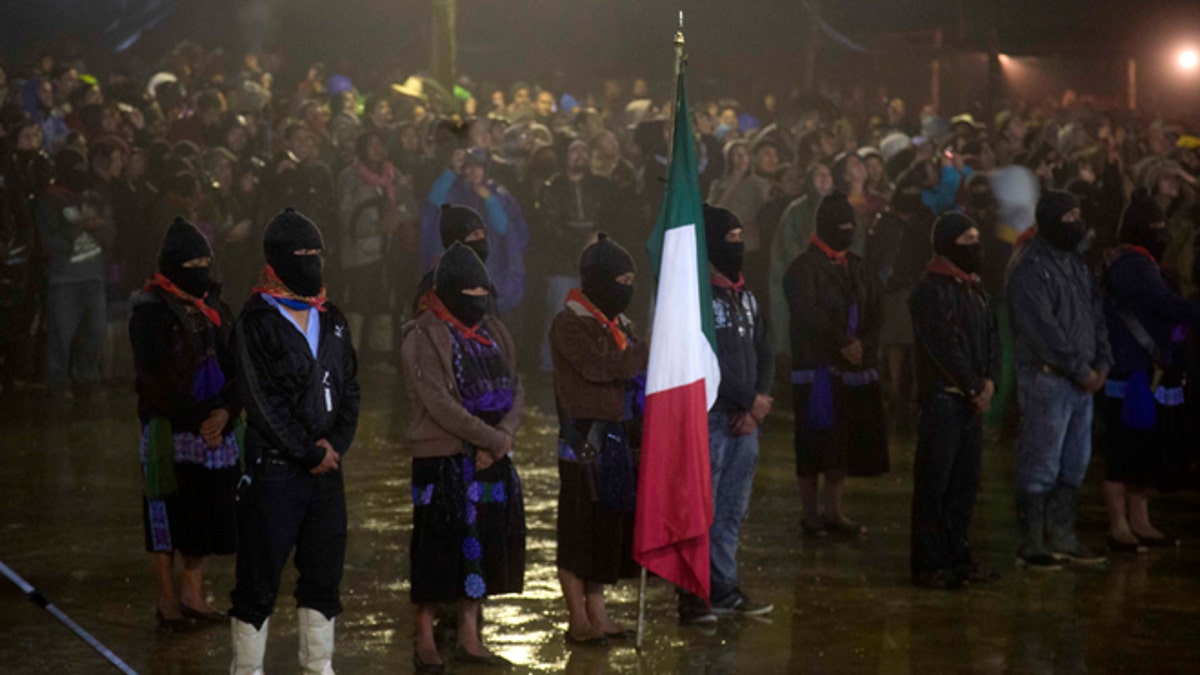
Members of the EZLN mark the 20th anniversary of the Zapatista uprising in Chiapas, Mexico, on Dec. 31, 2013. (AP2013)
SAN CRISTOBAL DE LAS CASAS, Mexico (AP) – In the misty mountain strongholds of the southern Mexico state of Chiapas, ski mask-clad members and supporters of the Zapatista rebel movement gathered to mark the 20th anniversary of a New Year's uprising that wrenched the world's attention to the plight of the country's impoverished and oft-ignored indigenous.
We were fooled, manipulated, controlled and forgotten. We were sunk in ignorance and poverty. But 20 years ago, on these days, we said 'enough.'
The Zapatistas and hundreds of sympathizers from around the world gathered Tuesday night to remember an armed uprising that although brief — calming after 12 days of bloodshed under a government truce — was followed by an occasionally tense two-decade standoff.
Before the revolt, "We were fooled, manipulated, controlled and forgotten. We were sunk in ignorance and poverty. But 20 years ago, on these days, we said 'enough,'" an indigenous leader known as Comandante Hortensia told the crowd at one of the celebrations, held in a schoolyard in the town of Oventic.
About 2,000 people from Mexico, the U.S., Europe and elsewhere danced, played basketball and sang political songs in the chilly night, as well as listening to Zapatista commanders speak in Spanish and the indigenous languages of Tzotzil and Tzeltal.
The Zapatista rebellion stunned Mexico and drew widespread support from leftists across the world with its message of indigenous rights and opposition to economic globalization. But since then, little has changed in the secretive, closed-off enclaves the Zapatistas have formed in the half-dozen communities they hold.
Poverty remains as bad as, or worse than it was before the uprising, in part because the Zapatistas refuse all government aid programs.
And the world's attention has drifted to other, more outwardly successful efforts in indigenous empowerment.
In Bolivia, where Evo Morales took office as the first indigenous president in 2006, Aymara and Quechua Indians now appear in the presidential Cabinet and as anchors on national news shows.
Pipe-smoking Zapatista leader Subcomandante Marcos seemed to acknowledge that many have turned their attention elsewhere.
"They left. Some went faster than others. And the majority of them don't look at us, or they do so with the same distance and intellectual disdain that they did before the dawn of Jan. 1, 1994," Marcos wrote in a statement released Saturday.
The movement itself has not always encouraged attention. After bursts of protest marches and nationwide tours, jungle conventions and biting, humorous communiques, it has sometimes withdrawn back into its communities for long periods of near-silence.
For some, its greatest achievement was prompting Mexico to enshrine sweeping anti-discrimination measures in its constitution in 2001. Passaged followed a Zapatista caravan across a dozen states to the capital, climaxing in dramatic speeches by masked rebels in Congress.
But the Zapatistas were enraged when lawmakers watered down sections that interested them most: expanding indigenous autonomy and control over land and natural resources.
Mexico's indigenous remain an oft-discriminated minority who often denied entry to, or service at, posh restaurants and stores. They only occasionally receive attention, as when a basketball team of Trique Indian boys, some of whom play shoeless, won a youth basketball tourney this year.
But the Zapatistas known by their initials as the EZLN are still alive and kicking, said the Roman Catholic Bishop of San Cristobal de las Casas, Felipe Arizmendi. The church has long played a role in indigenous movements in Chiapas.
"The EZLN remains alive, not as a military option, but as a social and political organization that fights for a dignified life," Arizmendi said last week. "It is an effort to demonstrate that autonomy is possible; you don't have to depend on the government."
Indeed, they don't: The Zapatistas run their own schools and health clinics, though most appear to be terribly underfunded and ill-equipped.
The Zapatistas have been criticized in the last decade for withdrawing too much from public view. They failed to endorse leftist candidate Andres Manuel López Obrador in the 2006 presidential elections, which he lost by a margin of about half a percentage point.
Nor have the communities' material conditions improved. Most Zapatistas still eke out meager livings as corn farmers, with occasional attempts to carve more farmland out of Chiapas' shrinking jungles. Marcos responded to such criticisms with his usual bristliness.
"What has the EZLN done for Indian communities? We are responding with the direct testimony of tens of thousands of our members," he wrote, saying the news media should ask themselves instead what they have done to improve pay, working conditions or readership for reporters.
Still Marcos said the act of rebellion itself is enough reason to celebrate.
"Rebellion, friends and enemies, is something that has to be celebrated, every day and at every hour. Because rebellion is also a celebration."
Some commentators warn that Mexico today may look chillingly like it did in 1994. The Zapatista uprising occurred on the very day the North American Free Trade Agreement took effect. The deal, hotly opposed by the left, opened Mexico's markets to U.S. goods.
This year, Mexico approved another major opening — energy reforms that will allow private and foreign firms to drill for oil in Mexico . That angered and frustrated the left.
"The atmosphere of victory that one finds today ... is reminiscent of the end of 1993," noted columnist Carlos Loret de Mola. The defeat of the left in Congress on energy reform "is opening more space for those who are betting on armed struggle," he wrote.
Follow us on twitter.com/foxnewslatino
Like us at facebook.com/foxnewslatino






































